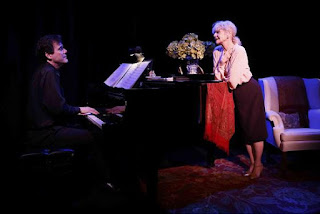 |
| Publicity photo of singer Patti Page pre-1978 from General Artists Corporation (management) |
"Flipside: The Patti Page Story," at 59E59 Theaters in a Front Page Productions/Square 1 Theatrics, in association with The University of Central Oklahoma, through December 30th, is a biography with music.
 |
| www.59e59.org |
In "Flipside...," her story as narrated by Clara Ann Fowler (Haley Jane Pierce) on the occasion of a 1965 tribute at KTUL for Miss Patti Page "The Singing Rage" (Lindise vanWinkle) with a sweet modesty and reserve. Clara will realize that hers is the voice of Patti Page, and, as her daddy, Ben Fowler (Willy Welch) had told her, "'Let 'em hear your voice, Clara Ann. 'Cause there's so much for them to hear."
The modesty and down-hominess shrouds Patti Page's accomplishments as an innovative musician. For instance, her recording of "Confess" has doubled up her voice for two parts -- a technique born of necessity now known as overdubbing. "We can't afford two voices," her manager Jack Rael (Justin Larman) says. She was to sing echoing herself on a number of hits after that one was produced.
On one occasion, by way of illustration, "Flipside..." cheats in taking advantage of the technique-- there are four Patti's singing in "With My Eyes Wide Open, I'm Dreaming," when Haley Jane Pierce and Lindsie van Winkle are joined by Jenny Rothmayer and Kassie Carroll in a Patti Page Quartet.
"Flipside..." makes the most of the sumptious array of gowns costume-designer Corey Martin has styled for it. Patti Page models a different one for each number.
There is a coda, a device not uncommon in the genre of biographical playwrighting, in "Flipside...," which helps us catch up with the singer today. At 85, Miss Patti Page is still performing. In 1998, she won a Grammy for her Live at Carnegie Hall: The 50th Anniversary Concert.
For more information abut "Flipside: The Patti Page Story," visit www.59e59.org
It was sad to hear that Patti Page died at the age of 85 on New Year's day 2013.












































